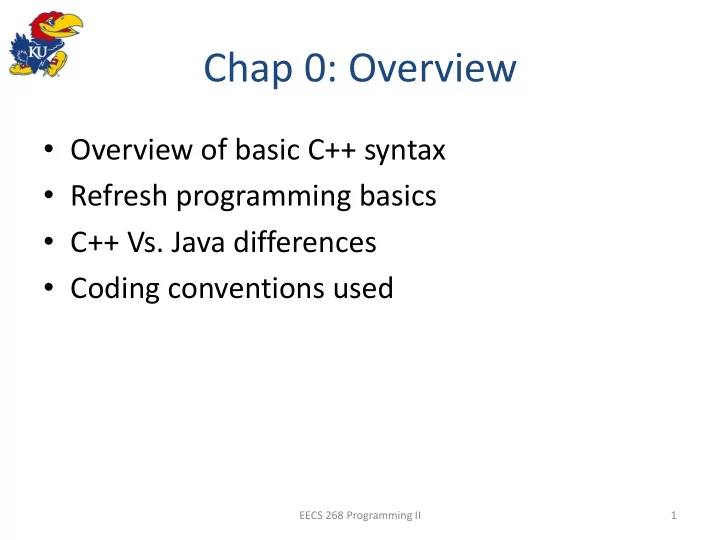

Chap 0: Overview • Overview of basic C++ syntax • Refresh programming basics • C++ Vs. Java differences • Coding conventions used EECS 268 Programming II 1
Basics - 1 • Comments – single line: // – multi- line: /* … */ • Identifiers and keywords – {_a-zA-Z}{_a-zA-Z0-9}* – keywords are reserved words • Fundamental data types – bool, char, int, float, double – modifiers: signed/unsigned, short/long EECS 268 Programming II 2
Basics - 2 • Variables – double radius; int count, i; • Constants – literal: ‘A’, ‘2’ – named: const double PI = 3.14159; • typedef statement – typedef double Real; EECS 268 Programming II 3
Basics - 3 • Assignments and expressions – arithmetic expressions – relational and logical expressions • Implicit type conversion – automatic type conversion with no loss of precision • Explicit type conversion – static_cast<type>(expression) – int ivol = static_cast<int>(volume); EECS 268 Programming II 4
Basics - 4 • Input – int a; cin >> a; – int a; scanf(“%d”, &a); • Output – cout << “Output is: “ << a << “ \ n”; – printf(“Output is: %d \ n”, a); see A1-basics.cpp EECS 268 Programming II 5
Basics - 5 • Functions type name (formal argument list) { body } • Selection statements – if, if-else, if-elseif-else, switch-case • Iteration statements – while, do-while, for – break, continue EECS 268 Programming II 6
Basics - 6 • Arrays – one dimensional: int arr[100]; arr[i] = 10; – multi-dimensional: int arr[100][10]; arr[i][j] = 10; – arrays are passed to functions by reference • C++ strings – string str = “EECS 268”; – size(), length(), compare, concatenate, index, etc. • C strings – char str[100]; – Null character ‘ \ 0’ terminates the string – strlen(), strcpy(), strcmp(), strcat(), index, etc. EECS 268 Programming II 7
Basics - 7 • Structures – to group data items struct Person{ string name; int age; double gpa; }; struct Person students[100]; students[0].name = “Adam Smith”; students[0].age = 20; – structs are passed by value to another function see A1-CppJava.cpp EECS 268 Programming II 8
Basics - 8 • File input / output – provide persistent storage – ifstream, ofstream, fstream ifstream inFile; ofstream ofile; inFile.open (“file.txt”); ofile.open(filename); inFile >> ch; ofile << ch; inFile.get(ch); ofile.put(ch); ch = inFile.peek(); ofile.open (“file”, ios::app); inFile.ignore(n); EECS 268 Programming II 9 see A1-fcopy.cpp
C++ (Compared to Java) • structs used to group data variables. • C++ uses preprocessor for macros, file-inclusion. • C++ can have stand-alone functions. • Constants/variables can be defined globally, in classes, or methods. • bool (vs. boolean) • Explicit memory deallocation ( delete) • See: – http://people.eecs.ku.edu/~miller/Courses/JavaToC++.html – Appendix A.12 in textbook see A1-BookStoreCustomer.cpp EECS 268 Programming II 10
Examples • See A1-basics.cpp • See A1-fcopy.cpp • See A1-CppJava -- .cpp / .java • See A1-BookStoreCustomer -- .cpp / .java EECS 268 Programming II 11
Coding Conventions Used • Need – to make it easier to read and maintain code – very important for large code bases – when multiple contributors • Multiple coding styles are prevalent – people have differing tastes and preferences • We impose some common coding practices for this class EECS 268 Programming II 12
Coding Conventions Used • Make Files – to keep list of dependencies and to build all your project files – discussed further in Lab-1 • Header (.h) and implementation (.cpp) files – ADT interface (class definition) should be in .h file • Comments – /* … */ -- for block (multi-line) comments – // … -- for single-line comments EECS 268 Programming II 13
Coding Conventions Used • Indentation – 2 or 4 spaces • For function definitions – open/close brace should be on its own line – block comment before each function tells what it does • For braces within functions (loops/branches) – open brace should be on same line as construct – close brace should be on its own line • Line width – a maximum of 80 characters on a single line EECS 268 Programming II 14
Coding Conventions Used • Vertical white space and comments – blank line between consecutive code constructs – comments before important code constructs • Horizontal white space – make it readable! if((a==b) || (c<a)) over if( ( a == b ) || ( c < a ) ) and if((a==b)||(c<a)) EECS 268 Programming II 15
Recommend
More recommend